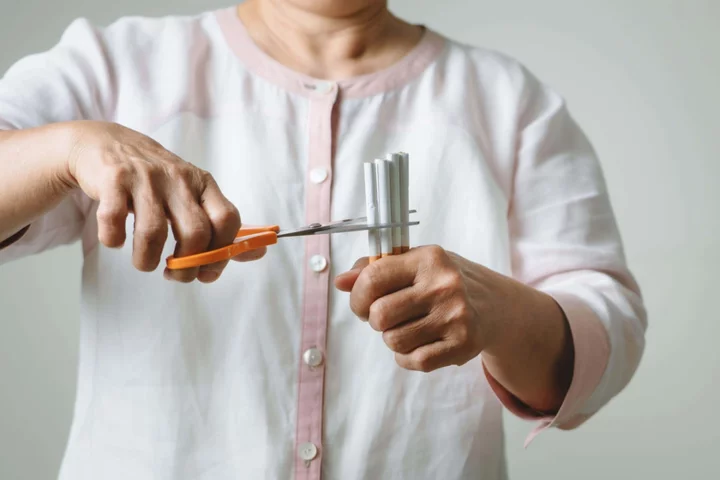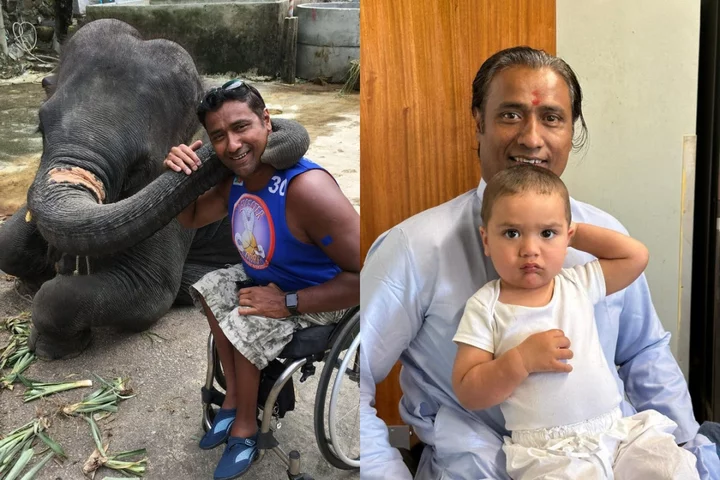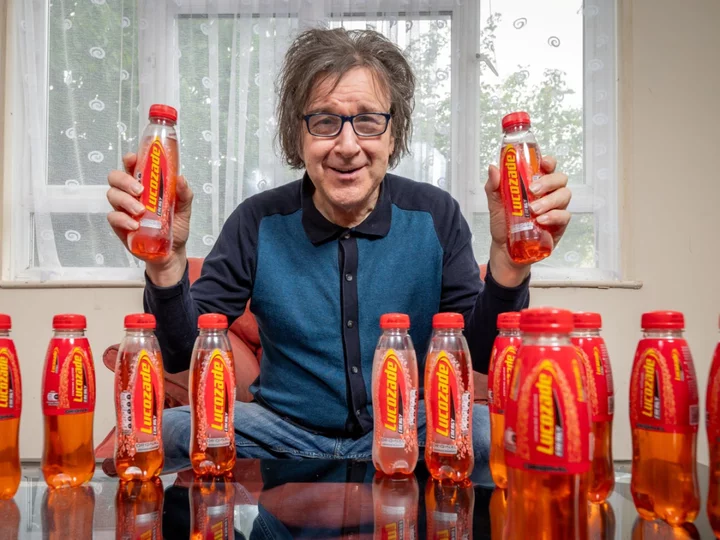
How quitting smoking can boost your health and finances – as Government considers adding messages to cigarette packs
Messages encouraging smokers to quit could be added to cigarette packs. A draft proposal with the suggestion is being considered by the Government. According to the Department of Health, these inserts will highlight the financial and health benefits of giving up smoking and the support available to those trying to quit. The Department of Health hopes the inserts – which have already been used in other countries including Canada and Israel, with Australia also planning to introduce them – could lead to an additional 30,000 smokers giving up, saving up to £1.6 billion in health costs. Smoking is still one of the most preventable causes of illness and death in the UK, with around 76,000 people dying from it every year, according to NHS figures. The consultation launched on Monday and will be running until October. In the meantime, it’s always a good time to try and stop smoking, and focusing on the positive outcomes can help you stay on track too. Here are some of the financial and health benefits of quitting smoking… More disposable income Smoking costs around £17.3 billion a year across England overall, according to the latest 2023 economic data analysis commissioned by public health charity Action on Smoking and Health (ASH). This includes a significant cost to the NHS and social care, with smoking-related admissions and primary treatments reportedly costing £1.9 billion yearly. However, quitting smoking could make a significant difference to people’s individual pockets too – a major incentive to beat the habit. Especially right now, with the cost of living so high. According to Everyone Health, if you get through 20 cigarettes a day, with a packet of cigarettes costing £13.30, that’s a spend of £93.10 per week, or £4,841.20 per year. The average smoker may smoke a bit less than that per day, but this could still add up to serious money. “The average smoker can save around £38 a week by quitting smoking, that’s £2,000 a year, according to the NHS,” said Abbas Kanani, a pharmacist at Chemist Click. What could you do for yourself and your family with that extra money? Better mental and physical healthThe good news is, evidence suggests quitting at any point in life leads to big improvements in your health, including increased life expectancy and lower disease risk. “Stopping smoking is one of the best things you will ever do for your health,” said Kanani. “Quitting smoking improves your physical health, and boosts your mental health and wellbeing after as little as six weeks of being smoke-free. Every time you smoke a cigarette, your body is flooded with thousands of chemicals, many of which are poisonous. “The day you stop, your body starts clearing itself of all those nasty toxins and the repair process begins. People who have quit also have increased positive mood compared with people who continue to smoke,” Kanani added: “Longer-term risks of cancer, lung disease, heart disease and stroke will be significantly reduced too. You will also be less likely to develop type 2 diabetes, bone disease including osteoporosis, eye disease and dementia.” Improved blood circulation “The blood circulation to your heart and muscles can improve, which will make physical activity easier and improve lung function, which leads to reductions in any cough, wheezing or other breathing problems,” continued Kanani. All of this will have a knock-on effect on how energised you feel day-to-day, as well as contributing to better general health in the short and long term. Improved sense of taste and smell Being able to taste and smell food better is another huge bonus to quitting smoking. George Sandhu, deputy superintendent pharmacist at Well Pharmacy, said: “There are a number of almost immediate benefits to stopping smoking, including healthier teeth and gums, fresher breath, and improved sense of taste and smell. In the longer term, you’ll probably find your breathing will improve, and ultimately you’ll probably end up living a longer, healthier life.” Protecting your loved ones from second-hand smoke Second-hand smoking or ‘passive smoking’ is dangerous too. According to the NHS, most of the smoke from a cigarette goes into the air around you and not your lungs – therefore it’s those around you or nearby that will breath it in. And as the World Health Organisation (WHO) highlights, tobacco kills more than 8 million people each year, including 1.3 million non-smokers who are exposed to second-hand smoke. “Quitting means you’ll protect your loved ones from the potential health harms of second-hand smoke too,” said Kanani. If you would like support to help you quit smoking, talk to your GP or local pharmacist. Read More Charity boss speaks out over ‘traumatic’ encounter with royal aide Ukraine war’s heaviest fight rages in east - follow live Is it ever safe to sunbathe? A beginner’s guide to pickling your homegrown fruit and veg Mother tried to cure son of disease by putting him in a hole as a child
1970-01-01 08:00

Experts have pinpointed exactly when society will collapse
A prediction about when society is most likely to collapse, made by scientists in the 1970s, has resurfaced – and it looks pretty bleak. Scientists at the Massachusetts Institute of Technology (MIT) used a computer to model patterns like population, natural resources and energy usage. The study, published by Club of Rome, picked out when these factors could hit “limits to growth”, which they said could lead to the downfall of modern life as we know it. They think we’ve got fewer than two decades left, with collapse due in 2040. Gulp. Sign up to our free Indy100 weekly newsletter At the time, the report wasn’t given much credence. But a similar study was carried out in 2009, and came up with similar results. Published by American Scientist, the more recent study found that the model’s results were “almost exactly on course”. "It is important to recognise that its predictions have not been invalidated and in fact seem quite on target. We are not aware of any model made by economists that is as accurate over such a long time span," the study said. And to make matters worse, Dutch sustainability researcher Gaya Herrington concurred with the prediction in 2021. Speaking to The Guardian, Herrington said: “From a research perspective, I felt a data check of a decades-old model against empirical observations would be an interesting exercise.” Herrington found that data aligned with the predictions made back in 1972, which had a worse case scenario of economic growth coming to halt at the end of this decade, and collapse around 10 years later. Thankfully, there was a reason to be cheerful too. She added: “The key finding of my study is that we still have a choice to align with a scenario that does not end in collapse. "With innovation in business, along with new developments by governments and civil society, continuing to update the model provides another perspective on the challenges and opportunities we have to create a more sustainable world.” Have your say in our news democracy. Click the upvote icon at the top of the page to help raise this article through the indy100 rankings.
1970-01-01 08:00

Paraplegic man with polio whose mother tried to cure him by putting him in a hole as a child now flourishing in the UK
A paraplegic man with polio who spent hours of his childhood in a hole in the ground in Mumbai, as his mother believed blood flow to his legs may cure the disease, and was “carried everywhere” until the age of 14, has said “you should never give up” as he defied the odds to become a professional wheelchair sportsman and father a child in his 50s. Jignesh (Jig) Vaidya, 52, who was born in Mumbai, India, but now lives in Leicester, contracted polio aged two as he was not “vaccinated at the right time” because his family could not afford it. This resulted in him being paralysed from the waist down, and he was hospitalised for at least six months at the age of four, with his legs in plaster to keep them straight. After this, Jignesh’s doctor said “there’s nothing we can do”, and since his family could not afford a wheelchair or further treatment, and his access to education was limited due to his disability, he remained at home for several years, with his mother Nirmala, now 83, “doing everything for him” – washing, feeding, changing and carrying him. Defying his difficult beginnings, Jignesh has spent his life moving across the world, becoming a professional wheelchair basketball player and enjoying a successful career, currently working as a project assistant at Maximus UK and broadcast assistant at the BBC, all before the birth of his now 20-month-old son, Jesse. He has not forgotten where his life began, however, and told PA Real Life: “As an Indian remedy, (my mother) dug a hole outside our house in the sun and put my whole body in it for six hours every day, neck down, in 30-degree heat. “She put really heavy bangles on both my legs and asked me to sit on the wall for three, four hours a day, dangling them, as she thought, ‘Jignesh will walk one day’.” Jignesh said his mother believed in Indian medication and thought the blood flow may help to cure his polio – a serious infection caused by a virus – but Jignesh described it as “hell”. From that point on, he thought, “this is going to be my life, this is it for me, it’s not going to get any better”. “I thought, ‘I’m going to be a loser – I hate to say that word – I’m not going to have any friends, and I’m going to be asking people for help all my life’,” he added. At the age of 14, Jignesh was given a wheelchair after his community rallied to raise some funds and he was finally able to go to school. He said he had to “catch up to the people who were ahead of (him)”, but he loved having some independence and no longer having to be carried by his family or others. He experienced a major setback when he moved to Dubai at 16, as he gave up his wheelchair to support another young boy with polio in Mumbai, and this left him in a dark place, mentally, as he had no “freedom”. Since then, however, he has moved to Leicester, received an “amazing education”, competed as a professional wheelchair basketball player, skydived, and fathered a son called Jesse, despite doctors saying this would not be possible. Jignesh said: “You should never give up in this life, and don’t be afraid to open up and ask for help. “Do what you’re best at and, if you work at something every day, whatever your goal is in life, you will get there. “It may take some time, maybe even years – it took me until the age of 20 to learn how to write my name in English – but I didn’t give up and look at me now.” From the age of 14, when Jignesh received his first wheelchair in Mumbai, he said he started to “flourish” and enjoyed going to school. However, he was subjected to discriminatory comments by his teachers, with one saying: “He’s handicapped, he can’t go at the front, put him in the back.” Since Jignesh’s late father Laxmikant, 66, was working in Dubai at the time, he ended up moving out there for two years at the age of 16 – but because his family could not afford to send him to school and he no longer had his wheelchair, he said he spent two years “looking out the window, watching people go by”. He said “there was nothing for (him)”, apart from a taxi ride once a month, and this significantly impacted his mental health, as he felt this had reversed all the progress he had made. “There was one point in my life, in those two years, where I was going to dark places and crying all the time,” he said. “I thought, ‘If mum’s not here, I could jump out the window and nobody will know. I can end it’, because I thought, ‘This is it, I can’t go back to what I had, I’m stuck’.” After his father earned enough money from those two years in Dubai, he and his family moved to the UK in 1988, when he was 18, and this is when everything changed. He received a new wheelchair in March 1989, aged 19, and started full-time education in September 1990, aged 20, where he learned English, maths, and how to use computers – and given he had impressive upper body strength and speed, he started playing sports as well, including wheelchair hockey and basketball. “I was a coloured person, a new arrival, couldn’t speak the language, and yet I was treated like everyone else,” he said. “I just thought, ‘Wow, I’m a part of society, I’m not being treated like a dog, like I was in Mumbai’, and if an opportunity comes in, I will take it, as there’s no going back. “When I started playing sports, I knew there and then that this is it, this is my life, this is my path.” Jignesh has since gone on to compete as a professional wheelchair basketball player internationally in places such as France, play for teams including MK Aces Wheelchair Basketball Club and Leicester Cobras, coach at the Coventry Crusaders club, skydive, and father Jesse with his partner Julie, 40, a teacher – confounding doctors. He goes to his local Nuffield Health gym every day, completing workouts and classes which have been adapted for him, and this helps to slow the progression of his polio as muscle weakness can increase over time. He “cherishes” being able to work with the “amazing” staff, including his personal trainer Matthew Molloy, in an inclusive environment where he is part of a team, supported, and everyone can “flourish”. Looking back, Jignesh realises why his mother, who he now cares for, would say, “everything happens for a reason”, and he is extremely grateful for his family’s love and support. He is excited to watch Jesse grow up, and he wants to continue encouraging disabled people to stay active, fight for their rights, and “never give up”. “I never thought that when I was in that hole, or when I was in Dubai and had nothing, that I’d be where I am today,” he said. “Sometimes, when I’m driving, I think, ‘This could be a movie; I’m going to wake up and be back in Mumbai’, so every day now, I pray and say, ‘Thank you’.” To find out more about Nuffield Health, visit: nuffieldhealth.com Read More Trypophobia: ‘Mushrooms, Beanie Babies and Doja Cat - I lived in fear for 30 years’ Lucozade addict drinks eight bottles a day and says it’s harder to quit than class-A drugs Charity boss speaks out over ‘traumatic’ encounter with royal aide Ukraine war’s heaviest fight rages in east - follow live
1970-01-01 08:00

Niger coup: Ousted President Bazoum to be charged with high treason, junta says
Coup leaders accuse the detained Mohamed Bazoum of undermining national security,
1970-01-01 08:00

Is it ever safe to sunbathe?
Summer holidays are in full swing – and it’s very hot in Europe. Returning with a sun-kissed glow is always a bonus, but is lounging around on sunbeds ever truly safe? “As UV rays from the sun reach our skin, they stimulate the production of melanin, a pigment responsible for giving our skin its colour. Melanin acts as a natural defence mechanism, as it absorbs UV radiation and helps protect the skin from damage,” says Dr Tim Clayton, consultant dermatologist at Pall Mall Medical in Manchester. “Increased melanin production leads to tanning of the skin, which is the body’s way of trying to shield itself from further UV exposure.” So, if we are sunbathing to tan, our skin is always defending itself. Is it OK to sunbathe for a short amount of time? The longer you’re exposed to the sun, the worse the impact and damage may be. “Excessive and unprotected sun exposure, especially with frequent sunburns, increases the likelihood of developing skin cancer, including basal cell carcinoma, squamous cell carcinoma, and melanoma,” says Clayton. Even if a tan develops without any visible signs of sunburn over a shorter period of time, the DNA in your skin cells can still be damaged, notes Clayton. “The DNA damage caused by UV radiation increases the risk of skin cancer, including the most dangerous form, melanoma.” What about SPF? “Sunbathing, even with the use of sunscreen, still carries some risks. While sunscreen can provide some level of protection, it is not foolproof, and other factors should be taken into consideration,” he explains. While sunscreen can help reduce the amount of UV radiation that penetrates the skin, it does not completely block it. “Some UV radiation can still reach the skin, increasing the risk of DNA damage, premature ageing, and skin cancer.” A lot of the time, the protection we use does not actually work as it should. “Sunscreens are designed to reduce the amount of UV radiation that reaches the skin, but they are not perfect barriers. Factors such as inadequate application, insufficient SPF, and not reapplying sunscreen regularly can compromise its effectiveness. Additionally, some areas of the body, like the eyes and lips, may not be adequately protected by sunscreen alone,” Clayton continues. Equally, we may expose ourselves to too much sun, because we think it will be safe. “Wearing sunscreen may give a false sense of security, leading individuals to stay in the sun for longer periods, or neglect other sun-safe practices, such as seeking shade or wearing protective clothing. Sunscreen should be used as part of a comprehensive sun protection strategy, rather than relying on it as the sole means of protection.” We are not always the best at applying it, either. Sunscreen application requires proper technique and thorough coverage to be effective. Many of us don’t apply enough sunscreen, miss certain areas, or fail to reapply it when needed. “These application errors can reduce the sunscreen’s effectiveness and leave the skin vulnerable to UV damage,” he says. Is a tan always bad for my skin? However much you may want to look bronzed, it is not safe. “While a tan is often seen as a desirable aesthetic for some individuals, it is important to understand that any change in skin colour, due to sun exposure, indicates damage to the skin.” How can I get a tan instead? A fake tan may have to be the answer if you want to protect your skin and get a glow. As Clayton says: “Self-tanning products or spray tans can provide a safer alternative to achieve a tanned appearance without subjecting the skin to harmful UV radiation.” Read More Charity boss speaks out over ‘traumatic’ encounter with royal aide Ukraine war’s heaviest fight rages in east - follow live A beginner’s guide to pickling your homegrown fruit and veg Messages urging smokers to quit could be placed inside cigarette packs King and Queen ‘utterly horrified’ by Hawaii wildfires in letter to Joe Biden
1970-01-01 08:00

Lucozade addict drinks eight bottles a day and says it’s harder to quit than class-A drugs
A grandfather is addicted to Lucozade despite having three heart attacks, and said it's harder to give up than class-A drugs. Garry Johnson, 65, began drinking coffee aged 12 and loved the caffeine buzz. The now-retired painter and decorator took cocaine and amphetamines in his teens, and after 15 years of on-off drug use went “cold turkey” when his son Sam was born in 1992. Keen to stay energised, he took up drinking 380ml bottle bottles of Lucozade Original, and now gets through eight a day. He's had the habit for 29 YEARS and it currently costs him around £150 a month. And at today's prices, his nearly three decade habit would have cost him more than £42,800. He had three heart attacks between 2012 and 2014 because of a hereditary heart condition, and doctors encouraged him to ditch caffeinated drinks. He gave up dairy and every other form of caffeine - but he still necks more than three litres of Lucozade a day. He said Lucozade is proving harder to give up than class-A drugs - because of the "after effect - like that lovely feeling in your mouth after you eat an expensive bit of chocolate." Garry, from Basildon, Essex, said: "I took cocaine every day but it was a piece of cake to give up - but I'd find it really hard to ever give up Lucozade. "I love it - not just the taste but the affect on my body makes me feel great. If I do go two or three hours without one, I fancy one... God knows how I'd be after two days.” He stopped using cocaine aged 30, when his son Sam, now 31, was born and went cold turkey because being a new dad was "stimulant enough". He started drinking Red Bull but found himself with migraines, and eventually moved onto Lucozade. He initially drank six a day, but has had eight a day for the last seven years. Now he goes to Tesco every day and buys one or two four-packs - depending how many bottles he already has stacked up in the fridge ready to drink. "I've always needed some kind of stimulant and eventually I realised Lucozade is perfect for me," he said. "After my heart attacks they told me to quit the energy drinks but I recently had new heart tests and my results are better than they've ever been. "I guess I've just found one that suits my body." But Garry said he doesn't even want to give up because it's a "part of his identity" - like a person's favourite shirt or their daily breakfast. He justifies the cost because he doesn't drink alcohol or smoke. He said: "£5 a day - that's less than a pint of beer today in some places." If you or someone you know is suffering from alcohol addiction, you can confidentially call the national alcohol helpline Drinkline on 0300 123 1110 or visit the NHS website here for information about the programmes available to you. If you or someone you know is suffering from drug addiction, you can seek confidential help and support 24-7 from Frank, by calling 0300 123 6600, texting 82111, sending an email or visiting their website here. SWNS Read More What I gained (and lost) by walking 10,000 steps each day for 5 months Husband ‘ruins’ dinner because of his wife’s typo: ‘The worst kind of control freak’ John Whaite says he ‘spent time apart’ from fiancé after ‘falling in love’ with Strictly pro
1970-01-01 08:00

Heavy rains bring deadly flash flood and landslide to northwest China
At least 21 people are dead and six others missing after a flash flood and landslide following torrential rains in the outskirts of northwestern China's Xi'an city, local authorities said Sunday.
1970-01-01 08:00

The Ukrainian refugees returning to war-torn homeland
Ukrainians share experiences of visiting families and friends back home, amidst daily danger alerts.
1970-01-01 08:00

When a 'fire hurricane' hit, Maui's warning sirens never sounded
Lahaina residents tell the BBC they had no official warning before "fire hurricane" engulfed their town.
1970-01-01 08:00

5 NBA players who played well in FIBA warm-up games this week
The 2023 FIBA World Cup starts in less than two weeks. Teams are playing warm-up games and NBA players are flashing their skills. Here are five NBA players who had strong performances this week.The FIBA World Cup starts on Aug. 25 and so far, most of the news coverage about the tournament has be...
1970-01-01 08:00

Anonymous Mets player calls Justin Verlander a ‘diva’, questions Scherzer relationship
An anonymous Mets player spilled the tea on Justin Verlander's and Max Scherzer's brief time in New York. Talk about pitcher drama.It wasn't enough for the Mets to lose to their rivals by a football scoreline this past weekend. No, the New York Mets just had to sink one level lowe...
1970-01-01 08:00

Ump Show: Angel Hernandez is back and predictably as awful as ever
Angel Hernandez recently made his 2023 debut behind the plate and his performance has left baseball fans disappointed but not surprised.Angel Hernandez is back behind the plate, much to the dismay of many fans all over the world. Over his tenure as a major league umpire, he's widely recogni...
1970-01-01 08:00
